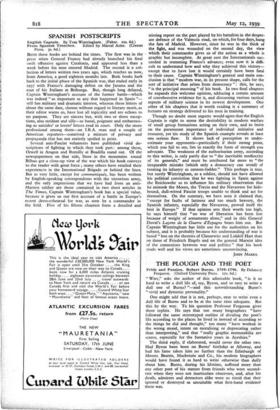THE PLOUGH AND THE POET
" WHY," asks the author of this admirable book, " is it so hard to write a dull life of, say, Byron, and so easy to write a dull one of Burns? "—and this notwithstanding Burns's " vivid and dynamic personality."
One might add that it is not, perhaps, easy to write even a dull life of Burns and to be at the same time adequate. But this by the way. To his question Professor Ferguson gives three replies. He says that too many biographers " have followed the same stereotyped outline of dividing the poet's life according to the places he lived in instead of according to the things he did and thought," too many " have worked in the wrong mood, intent on moralising or deprecating rather than interpreting," and that " really graphic memorabilia are scarce, especially for the formative years in Ayrshire."
The third reply, if elaborated, would cover the other two. Had Byron been born on Burns' birthday at Alloway, and had his fame taken him no further than the Edinburgh of Messrs. Beattie, Mackenzie and Co., his modern biographers would have found it as hard to write otherwise than dully about him. Burns, during his lifetime, suffered more than any other poet of his stature from friends who were second- rate when they were not inarticulate observers, and, after his death, admirers and detractors alike were so timid that they ignored or destroyed as unsuitable what first-hand evidence there was. To put it in another way, we have not been able to see the poet for the plough. Being a creature of " pride and passion "—to use his own phrase, though he was posing for " Clarinda " when he used it—Burns felt obliged to glory in a situation which was, in fact, no less a curse than a glory, and his own defiant statements have helped to mislead subsequent commentators (including Scott, Carlyle, Henley, and occa- sionally Professor Ferguson) into falling back upon the peasant when the behaviour of the poet created a dilemma.
Professor Ferguson, disclaiming the title of biographer, has confined his narration of events to three chronological tables, and he treats of Burns in seven chapters, without footnotes or appendices. He opens with " Scotland," and after showing the poet with regard to " Education," " Men," " Women," " Livelihood," and Song," ends with him as " The Scot." " Unsupported oral tradition " is avoided as basic material for a picture that is composed from Burns's letters and poems and the records of his immediate contemporaries.
For such an undertaking no man living is better qualified than the scholarly, detached, yet sympathetic editor of the poet's letters. Professor Ferguson has deeply considered every word written by or about Burns, he has had unique access to original documents, and in default of footnotes he can refer us to a score of " fully documented articles on con- troversial points " by himself, which, though always illumi- nating and usually correct, have evoked " an almost passionate apathy." In addition, he has a point of view and a pleasantly acidulated humour which he does not scruple to exercise against the suppressive methods of certain Scottish " self- appointed literary executors " of the poet who continue to lie in wait for adventurous biographers.
Unfortunately this author's partial knowledge and under- standing of Scotland, while they give a welcome detachment, invalidate at some points his interpretation of Burns himself. This is most noticeable in the chapters " Scotland " and " Women." In his disgusted pity for Scottish eighteenth- century diet and conditions, he forgets the hygienic contrast between the poor man's life in crowded urban and in country districts, and he ignores the wealth (set forth in Sir David Lyndsay's famous poem) of freshwater and saltwater fish, the game, the healthful sour-milk dishes, cheeses, puddings, scones and cakes. Even the much-decried " braxy " mutton was really mutton pickled by a process not unwholesome, however distasteful it may seem to the germ-scared American of today who spends so much of his time stripping tin and cellophane wrappings from his dinner. Temperamental constitution as much as diet may well account for Burns's early collapse.
Similar arguments may be put forward concerning the poet's attitude towards what Professor Ferguson calls the " red-knuckled, barefooted country lasses." Beauty of form and colour, especially as to hands and feet, have never been a class perquisite in Scotland. Further, the Scot's traditional attitude towards sex, as his songs demonstrate, is far liker to the Frenchman's than to the Englishman's or the American's, and any caddishness which may arise from it is correspond- ingly not to be measured by English or American standards.
These, however, are among the few doubtful queries which occur in reading a fresh and welcome survey for which one could wish that a less misleading title might have been found. If it is hard to write a good book on Burns, it is almost as hard to find a good title.
CATHERINE CARSWELL.



















































 Previous page
Previous page